Detailed Reflection on a Mental Health Assessment Case Study Analysis
VerifiedAdded on 2022/12/30
|5
|1552
|60
Report
AI Summary
This report reflects on a case study of Alison Wells, a divorced woman experiencing mental health challenges. The report analyzes her symptoms, including sleep disturbances, loss of energy, and changes in relationships, and explores the impact of her condition on her daily life and financial stability. It examines Alison's feelings of rejection, financial struggles, and suicidal ideation. The reflection discusses potential goals for Alison, such as setting boundaries, committing to therapy, and practicing meditation. Furthermore, it suggests actions to alleviate her issues, including improved communication, consultation with healthcare providers, and renewed hope. The report highlights the importance of early intervention and the potential long-term physical and socioeconomic consequences of untreated mental health problems. The analysis emphasizes the need for setting goals and seeking assistance to manage mental health conditions effectively, drawing on relevant research to support its conclusions. This assignment is a reflection on a mental health assessment case study, contributing to the understanding of mental health and its management.
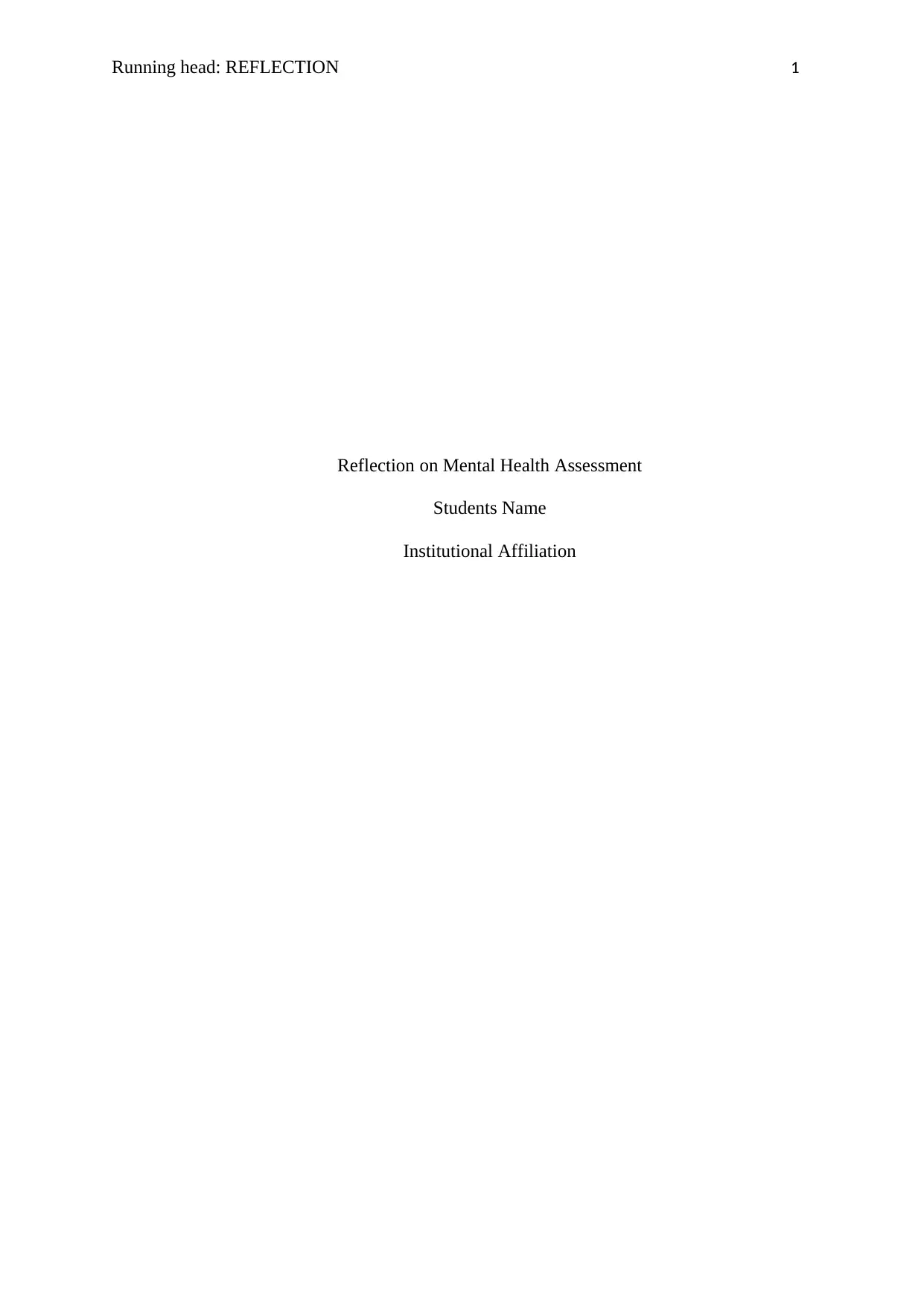
Running head: REFLECTION 1
Reflection on Mental Health Assessment
Students Name
Institutional Affiliation
Reflection on Mental Health Assessment
Students Name
Institutional Affiliation
Paraphrase This Document
Need a fresh take? Get an instant paraphrase of this document with our AI Paraphraser
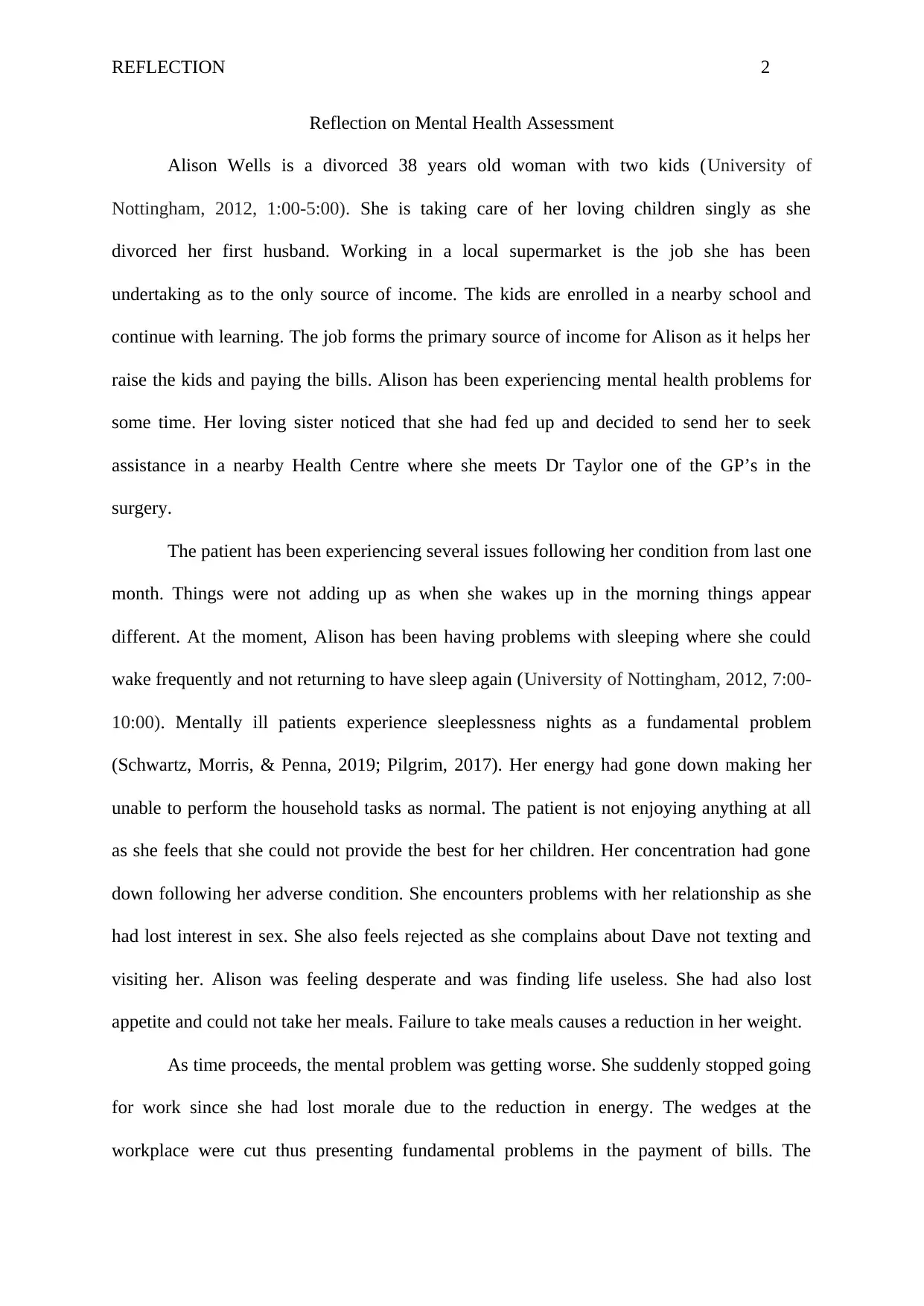
REFLECTION 2
Reflection on Mental Health Assessment
Alison Wells is a divorced 38 years old woman with two kids (University of
Nottingham, 2012, 1:00-5:00). She is taking care of her loving children singly as she
divorced her first husband. Working in a local supermarket is the job she has been
undertaking as to the only source of income. The kids are enrolled in a nearby school and
continue with learning. The job forms the primary source of income for Alison as it helps her
raise the kids and paying the bills. Alison has been experiencing mental health problems for
some time. Her loving sister noticed that she had fed up and decided to send her to seek
assistance in a nearby Health Centre where she meets Dr Taylor one of the GP’s in the
surgery.
The patient has been experiencing several issues following her condition from last one
month. Things were not adding up as when she wakes up in the morning things appear
different. At the moment, Alison has been having problems with sleeping where she could
wake frequently and not returning to have sleep again (University of Nottingham, 2012, 7:00-
10:00). Mentally ill patients experience sleeplessness nights as a fundamental problem
(Schwartz, Morris, & Penna, 2019; Pilgrim, 2017). Her energy had gone down making her
unable to perform the household tasks as normal. The patient is not enjoying anything at all
as she feels that she could not provide the best for her children. Her concentration had gone
down following her adverse condition. She encounters problems with her relationship as she
had lost interest in sex. She also feels rejected as she complains about Dave not texting and
visiting her. Alison was feeling desperate and was finding life useless. She had also lost
appetite and could not take her meals. Failure to take meals causes a reduction in her weight.
As time proceeds, the mental problem was getting worse. She suddenly stopped going
for work since she had lost morale due to the reduction in energy. The wedges at the
workplace were cut thus presenting fundamental problems in the payment of bills. The
Reflection on Mental Health Assessment
Alison Wells is a divorced 38 years old woman with two kids (University of
Nottingham, 2012, 1:00-5:00). She is taking care of her loving children singly as she
divorced her first husband. Working in a local supermarket is the job she has been
undertaking as to the only source of income. The kids are enrolled in a nearby school and
continue with learning. The job forms the primary source of income for Alison as it helps her
raise the kids and paying the bills. Alison has been experiencing mental health problems for
some time. Her loving sister noticed that she had fed up and decided to send her to seek
assistance in a nearby Health Centre where she meets Dr Taylor one of the GP’s in the
surgery.
The patient has been experiencing several issues following her condition from last one
month. Things were not adding up as when she wakes up in the morning things appear
different. At the moment, Alison has been having problems with sleeping where she could
wake frequently and not returning to have sleep again (University of Nottingham, 2012, 7:00-
10:00). Mentally ill patients experience sleeplessness nights as a fundamental problem
(Schwartz, Morris, & Penna, 2019; Pilgrim, 2017). Her energy had gone down making her
unable to perform the household tasks as normal. The patient is not enjoying anything at all
as she feels that she could not provide the best for her children. Her concentration had gone
down following her adverse condition. She encounters problems with her relationship as she
had lost interest in sex. She also feels rejected as she complains about Dave not texting and
visiting her. Alison was feeling desperate and was finding life useless. She had also lost
appetite and could not take her meals. Failure to take meals causes a reduction in her weight.
As time proceeds, the mental problem was getting worse. She suddenly stopped going
for work since she had lost morale due to the reduction in energy. The wedges at the
workplace were cut thus presenting fundamental problems in the payment of bills. The
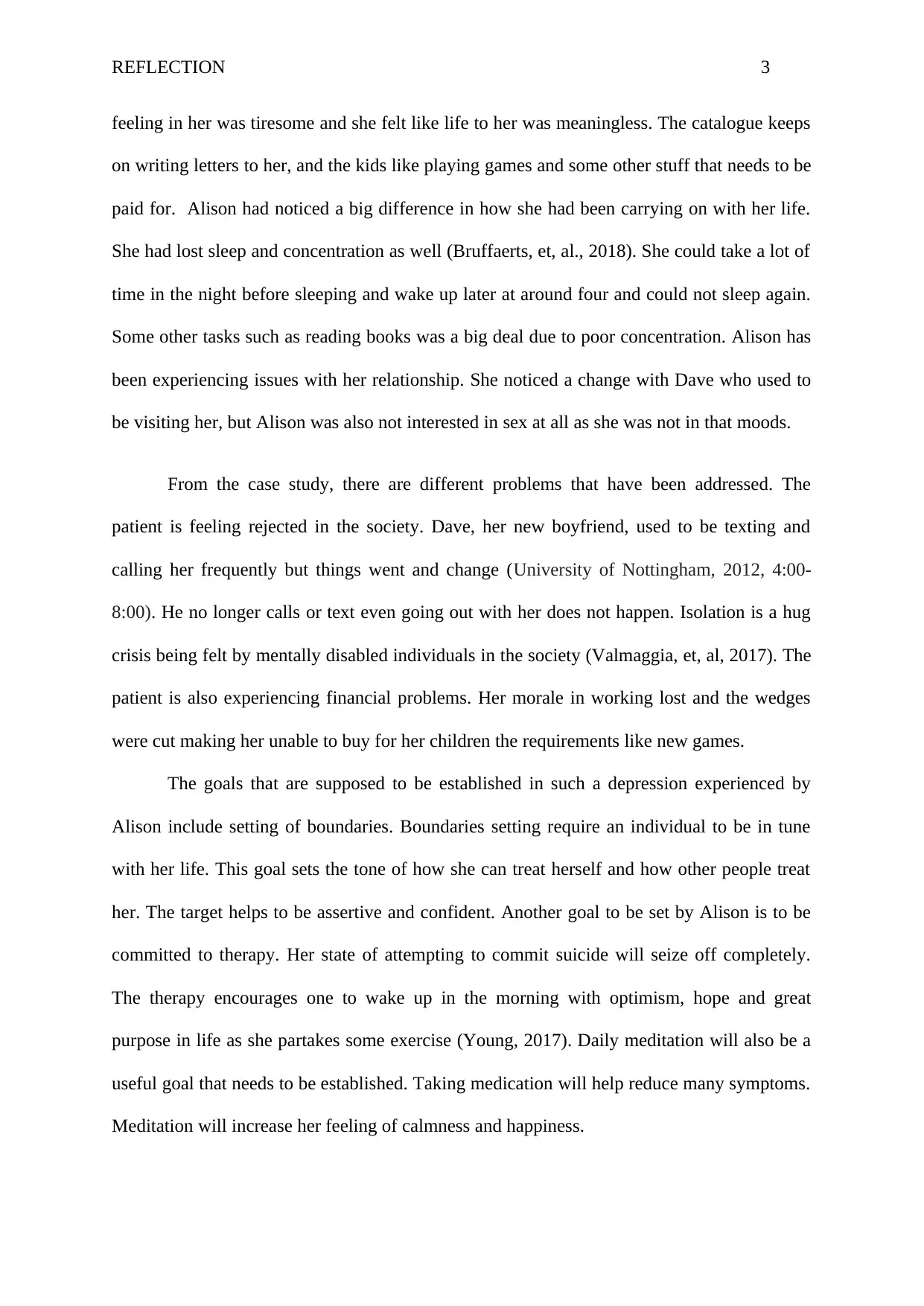
REFLECTION 3
feeling in her was tiresome and she felt like life to her was meaningless. The catalogue keeps
on writing letters to her, and the kids like playing games and some other stuff that needs to be
paid for. Alison had noticed a big difference in how she had been carrying on with her life.
She had lost sleep and concentration as well (Bruffaerts, et, al., 2018). She could take a lot of
time in the night before sleeping and wake up later at around four and could not sleep again.
Some other tasks such as reading books was a big deal due to poor concentration. Alison has
been experiencing issues with her relationship. She noticed a change with Dave who used to
be visiting her, but Alison was also not interested in sex at all as she was not in that moods.
From the case study, there are different problems that have been addressed. The
patient is feeling rejected in the society. Dave, her new boyfriend, used to be texting and
calling her frequently but things went and change (University of Nottingham, 2012, 4:00-
8:00). He no longer calls or text even going out with her does not happen. Isolation is a hug
crisis being felt by mentally disabled individuals in the society (Valmaggia, et, al, 2017). The
patient is also experiencing financial problems. Her morale in working lost and the wedges
were cut making her unable to buy for her children the requirements like new games.
The goals that are supposed to be established in such a depression experienced by
Alison include setting of boundaries. Boundaries setting require an individual to be in tune
with her life. This goal sets the tone of how she can treat herself and how other people treat
her. The target helps to be assertive and confident. Another goal to be set by Alison is to be
committed to therapy. Her state of attempting to commit suicide will seize off completely.
The therapy encourages one to wake up in the morning with optimism, hope and great
purpose in life as she partakes some exercise (Young, 2017). Daily meditation will also be a
useful goal that needs to be established. Taking medication will help reduce many symptoms.
Meditation will increase her feeling of calmness and happiness.
feeling in her was tiresome and she felt like life to her was meaningless. The catalogue keeps
on writing letters to her, and the kids like playing games and some other stuff that needs to be
paid for. Alison had noticed a big difference in how she had been carrying on with her life.
She had lost sleep and concentration as well (Bruffaerts, et, al., 2018). She could take a lot of
time in the night before sleeping and wake up later at around four and could not sleep again.
Some other tasks such as reading books was a big deal due to poor concentration. Alison has
been experiencing issues with her relationship. She noticed a change with Dave who used to
be visiting her, but Alison was also not interested in sex at all as she was not in that moods.
From the case study, there are different problems that have been addressed. The
patient is feeling rejected in the society. Dave, her new boyfriend, used to be texting and
calling her frequently but things went and change (University of Nottingham, 2012, 4:00-
8:00). He no longer calls or text even going out with her does not happen. Isolation is a hug
crisis being felt by mentally disabled individuals in the society (Valmaggia, et, al, 2017). The
patient is also experiencing financial problems. Her morale in working lost and the wedges
were cut making her unable to buy for her children the requirements like new games.
The goals that are supposed to be established in such a depression experienced by
Alison include setting of boundaries. Boundaries setting require an individual to be in tune
with her life. This goal sets the tone of how she can treat herself and how other people treat
her. The target helps to be assertive and confident. Another goal to be set by Alison is to be
committed to therapy. Her state of attempting to commit suicide will seize off completely.
The therapy encourages one to wake up in the morning with optimism, hope and great
purpose in life as she partakes some exercise (Young, 2017). Daily meditation will also be a
useful goal that needs to be established. Taking medication will help reduce many symptoms.
Meditation will increase her feeling of calmness and happiness.
⊘ This is a preview!⊘
Do you want full access?
Subscribe today to unlock all pages.

Trusted by 1+ million students worldwide
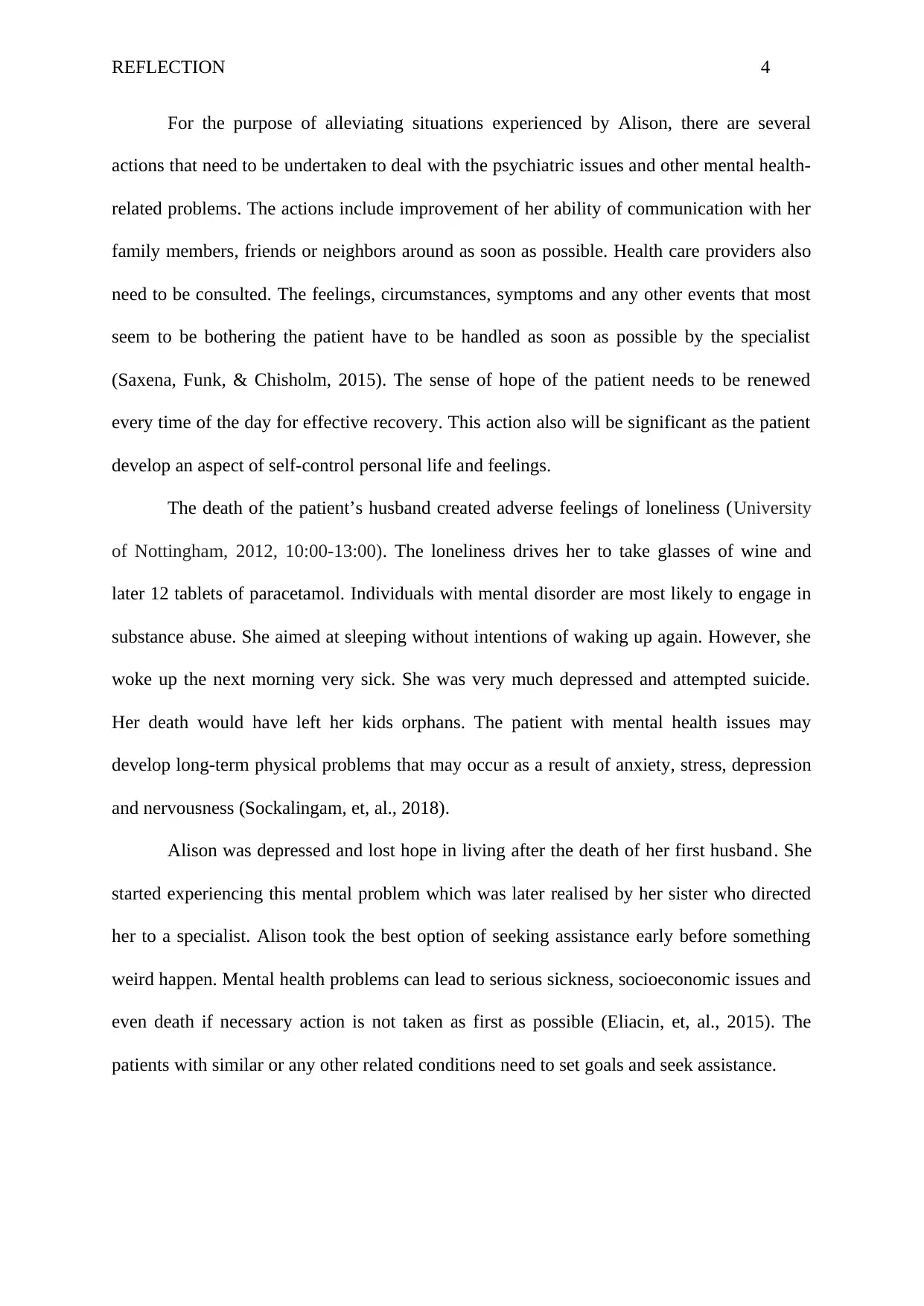
REFLECTION 4
For the purpose of alleviating situations experienced by Alison, there are several
actions that need to be undertaken to deal with the psychiatric issues and other mental health-
related problems. The actions include improvement of her ability of communication with her
family members, friends or neighbors around as soon as possible. Health care providers also
need to be consulted. The feelings, circumstances, symptoms and any other events that most
seem to be bothering the patient have to be handled as soon as possible by the specialist
(Saxena, Funk, & Chisholm, 2015). The sense of hope of the patient needs to be renewed
every time of the day for effective recovery. This action also will be significant as the patient
develop an aspect of self-control personal life and feelings.
The death of the patient’s husband created adverse feelings of loneliness (University
of Nottingham, 2012, 10:00-13:00). The loneliness drives her to take glasses of wine and
later 12 tablets of paracetamol. Individuals with mental disorder are most likely to engage in
substance abuse. She aimed at sleeping without intentions of waking up again. However, she
woke up the next morning very sick. She was very much depressed and attempted suicide.
Her death would have left her kids orphans. The patient with mental health issues may
develop long-term physical problems that may occur as a result of anxiety, stress, depression
and nervousness (Sockalingam, et, al., 2018).
Alison was depressed and lost hope in living after the death of her first husband. She
started experiencing this mental problem which was later realised by her sister who directed
her to a specialist. Alison took the best option of seeking assistance early before something
weird happen. Mental health problems can lead to serious sickness, socioeconomic issues and
even death if necessary action is not taken as first as possible (Eliacin, et, al., 2015). The
patients with similar or any other related conditions need to set goals and seek assistance.
For the purpose of alleviating situations experienced by Alison, there are several
actions that need to be undertaken to deal with the psychiatric issues and other mental health-
related problems. The actions include improvement of her ability of communication with her
family members, friends or neighbors around as soon as possible. Health care providers also
need to be consulted. The feelings, circumstances, symptoms and any other events that most
seem to be bothering the patient have to be handled as soon as possible by the specialist
(Saxena, Funk, & Chisholm, 2015). The sense of hope of the patient needs to be renewed
every time of the day for effective recovery. This action also will be significant as the patient
develop an aspect of self-control personal life and feelings.
The death of the patient’s husband created adverse feelings of loneliness (University
of Nottingham, 2012, 10:00-13:00). The loneliness drives her to take glasses of wine and
later 12 tablets of paracetamol. Individuals with mental disorder are most likely to engage in
substance abuse. She aimed at sleeping without intentions of waking up again. However, she
woke up the next morning very sick. She was very much depressed and attempted suicide.
Her death would have left her kids orphans. The patient with mental health issues may
develop long-term physical problems that may occur as a result of anxiety, stress, depression
and nervousness (Sockalingam, et, al., 2018).
Alison was depressed and lost hope in living after the death of her first husband. She
started experiencing this mental problem which was later realised by her sister who directed
her to a specialist. Alison took the best option of seeking assistance early before something
weird happen. Mental health problems can lead to serious sickness, socioeconomic issues and
even death if necessary action is not taken as first as possible (Eliacin, et, al., 2015). The
patients with similar or any other related conditions need to set goals and seek assistance.
Paraphrase This Document
Need a fresh take? Get an instant paraphrase of this document with our AI Paraphraser
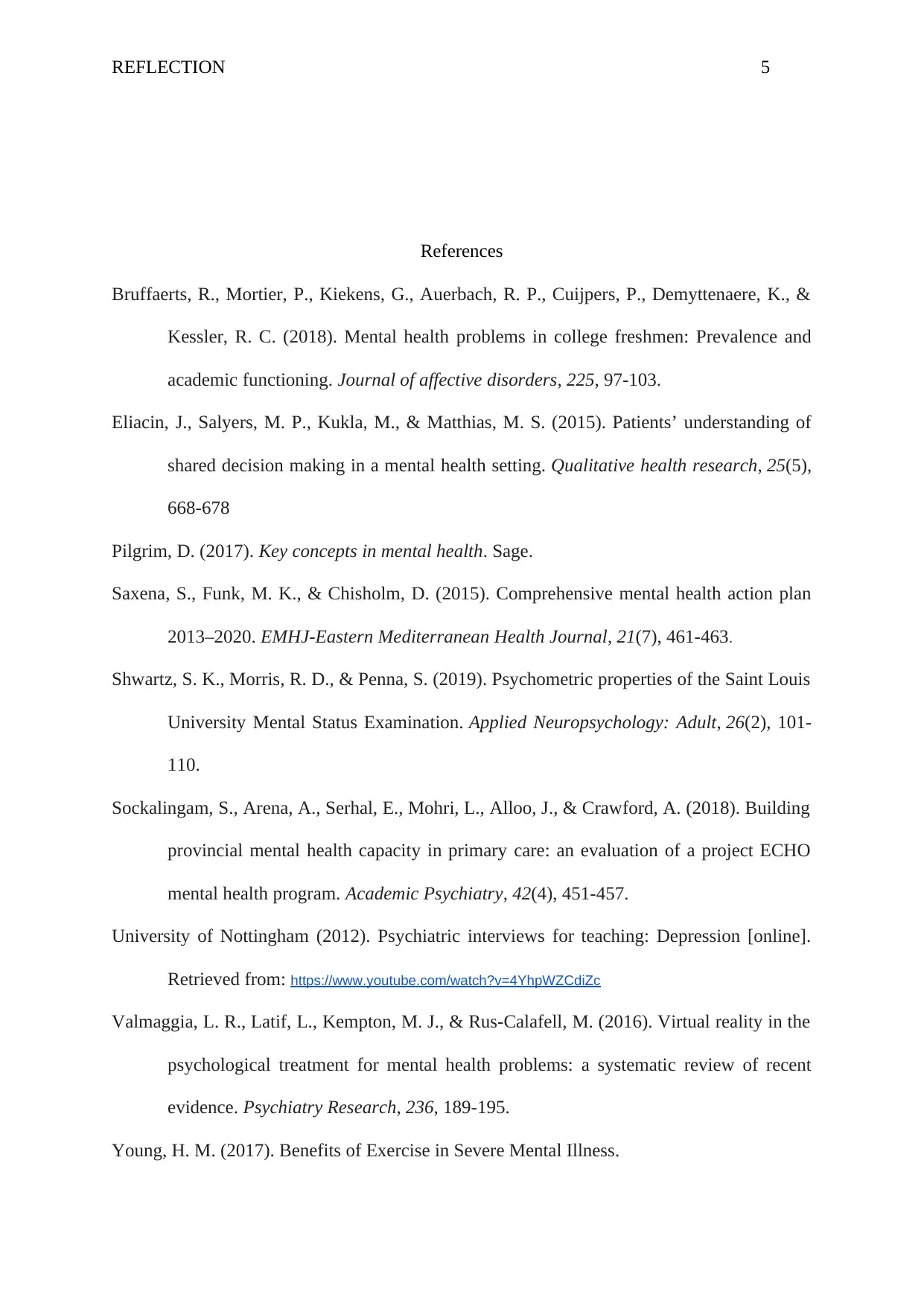
REFLECTION 5
References
Bruffaerts, R., Mortier, P., Kiekens, G., Auerbach, R. P., Cuijpers, P., Demyttenaere, K., &
Kessler, R. C. (2018). Mental health problems in college freshmen: Prevalence and
academic functioning. Journal of affective disorders, 225, 97-103.
Eliacin, J., Salyers, M. P., Kukla, M., & Matthias, M. S. (2015). Patients’ understanding of
shared decision making in a mental health setting. Qualitative health research, 25(5),
668-678
Pilgrim, D. (2017). Key concepts in mental health. Sage.
Saxena, S., Funk, M. K., & Chisholm, D. (2015). Comprehensive mental health action plan
2013–2020. EMHJ-Eastern Mediterranean Health Journal, 21(7), 461-463.
Shwartz, S. K., Morris, R. D., & Penna, S. (2019). Psychometric properties of the Saint Louis
University Mental Status Examination. Applied Neuropsychology: Adult, 26(2), 101-
110.
Sockalingam, S., Arena, A., Serhal, E., Mohri, L., Alloo, J., & Crawford, A. (2018). Building
provincial mental health capacity in primary care: an evaluation of a project ECHO
mental health program. Academic Psychiatry, 42(4), 451-457.
University of Nottingham (2012). Psychiatric interviews for teaching: Depression [online].
Retrieved from: https://www.youtube.com/watch?v=4YhpWZCdiZc
Valmaggia, L. R., Latif, L., Kempton, M. J., & Rus-Calafell, M. (2016). Virtual reality in the
psychological treatment for mental health problems: a systematic review of recent
evidence. Psychiatry Research, 236, 189-195.
Young, H. M. (2017). Benefits of Exercise in Severe Mental Illness.
References
Bruffaerts, R., Mortier, P., Kiekens, G., Auerbach, R. P., Cuijpers, P., Demyttenaere, K., &
Kessler, R. C. (2018). Mental health problems in college freshmen: Prevalence and
academic functioning. Journal of affective disorders, 225, 97-103.
Eliacin, J., Salyers, M. P., Kukla, M., & Matthias, M. S. (2015). Patients’ understanding of
shared decision making in a mental health setting. Qualitative health research, 25(5),
668-678
Pilgrim, D. (2017). Key concepts in mental health. Sage.
Saxena, S., Funk, M. K., & Chisholm, D. (2015). Comprehensive mental health action plan
2013–2020. EMHJ-Eastern Mediterranean Health Journal, 21(7), 461-463.
Shwartz, S. K., Morris, R. D., & Penna, S. (2019). Psychometric properties of the Saint Louis
University Mental Status Examination. Applied Neuropsychology: Adult, 26(2), 101-
110.
Sockalingam, S., Arena, A., Serhal, E., Mohri, L., Alloo, J., & Crawford, A. (2018). Building
provincial mental health capacity in primary care: an evaluation of a project ECHO
mental health program. Academic Psychiatry, 42(4), 451-457.
University of Nottingham (2012). Psychiatric interviews for teaching: Depression [online].
Retrieved from: https://www.youtube.com/watch?v=4YhpWZCdiZc
Valmaggia, L. R., Latif, L., Kempton, M. J., & Rus-Calafell, M. (2016). Virtual reality in the
psychological treatment for mental health problems: a systematic review of recent
evidence. Psychiatry Research, 236, 189-195.
Young, H. M. (2017). Benefits of Exercise in Severe Mental Illness.
1 out of 5
Related Documents
Your All-in-One AI-Powered Toolkit for Academic Success.
+13062052269
info@desklib.com
Available 24*7 on WhatsApp / Email
![[object Object]](/_next/static/media/star-bottom.7253800d.svg)
Unlock your academic potential
Copyright © 2020–2026 A2Z Services. All Rights Reserved. Developed and managed by ZUCOL.




